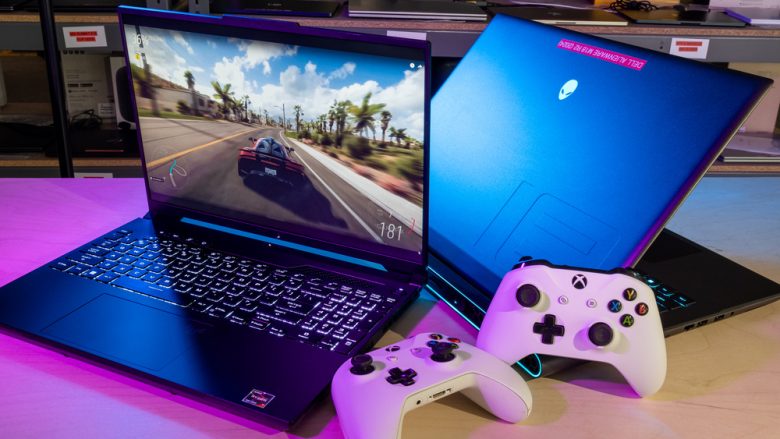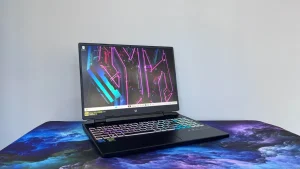The gaming industry is constantly evolving, and 4K gaming has become a major trend. The 4K resolution is known for its stunning visuals and unmatched detail. It’s four times higher than standard 1080p. The growth of 4K gaming is attributed to advancements in both hardware and software as well as an increasing demand for immersive experiences. Owning a device that can handle 4K gaming has become a necessity for gamers. Many gamers wonder if gaming laptops with their compact design can support 4K gaming. Answers are multifaceted and depend on many factors. This blog will cover the capabilities of 4K laptop gaming, their technical requirements, and their performance in real life.
Explore the Capabilities of Gaming Laptops:
In recent years, gaming laptops have made great strides. Previously considered inferior to desktop counterparts, gaming laptops now feature powerful hardware, high refresh rate displays, and cutting-edge features that rival the most robust desktop gaming systems. Gaming laptops are equipped with dedicated GPUs from leading industry players such as NVIDIA or AMD. They also have multi-core CPUs capable of handling heavy gaming loads. The devices are portable but still offer a high level of performance.
Some high-end gaming notebooks are marketed with 4K ready, meaning they have native 4K displays as well as the hardware necessary to run games at this high resolution. NVIDIA’s GeForce RTX GPUs, such as the RTX3070, 3080, and 4080, are widely regarded as capable of delivering a 4K gaming experience. Processors such as Intel’s Core i7 or Core i9 series, AMD’s Ryzen 7 or Ryzen 9 series, and AMD’s Ryzen 7 provide the computational power needed to render high-quality graphics while maintaining smooth frame rates.
Gaming laptops increasingly support advanced technologies such as ray-tracing and Deep Learning Super Sampling (DLSS), which improve graphical quality and optimize performance for games in 4K.
While the hardware is impressive, not all gaming laptops have the same capabilities. As they lack the GPU power or thermal performance required to handle such demanding tasks, entry-level laptops, and mid-tier models are unlikely to provide consistent 4K gaming. High-end laptops are designed to support 4K gaming, but they often cost more.
4K Gaming on Laptops: Technical Considerations
The hardware of a laptop is put to the test by 4K gaming. For a smooth and enjoyable gaming experience, gamers need to take into consideration several technical factors.
The GPU is the first thing to consider, as it plays a key role in rendering visuals at 4K. High-performance GPUs such as AMD’s Radeon RX or NVIDIA’s RTX are the only ones capable of achieving smooth frame rates and 4K resolutions in graphically intense games. Laptops with older GPU generations or integrated graphics will struggle to handle these demands if they can do so at all.
Display is another important factor. Not all displays are equal. While most gaming laptops have screens with 4K resolution, they’re not all created equal. The visual experience is directly affected by the panel type (TN, OLED, or IPS) and refresh rate (measured in Hz). A 4K gaming display with IPS or an OLED is preferred due to the superior color accuracy and viewing angle. A refresh rate of 60 Hz or more is also recommended for a fluid gaming environment.
The CPU also plays a vital role in the gameplay since it is responsible for background processes. For 4K gaming, a powerful multi-core CPU such as AMD’s Ryzen 9 or Intel’s Core i9 is recommended.
Thermal management can also be a challenge with 4K gaming laptops. Thermal throttling can negatively impact performance when rendering high-resolution graphics. This issue is addressed by manufacturers who use advanced cooling technologies such as multiple fans and liquid cooling mechanisms. They also incorporate enhanced airflow designs. These solutions may add weight to the laptop and reduce its portability.
Storage and RAM are also important. Modern games often require a lot of storage, especially when they use 4K textures. SSDs are the best choice for laptops because they offer faster loading times and better performance. A minimum of 16GB of RAM is recommended for 4K gaming. However, 32GB of RAM is best for future-proofing.
Performance and Visual Quality Factors:
Although gaming laptops are technically capable of supporting 4K gaming, the best performance and visual quality is often achieved by negotiating a series of tradeoffs. The balance between frame rate and resolution is a major challenge. A frame rate of at least 60 FPS is considered essential by many gamers for smooth gameplay. Running games at 4K resolution is incredibly demanding on hardware and can cause frame rate drops, even on high-end devices.
Many gamers have developed technologies such as NVIDIA’s DLSS (Dual Layer Super Resolution) or AMD’s FSR (FidelityFX Super Resolution) to combat this problem. These AI-driven tools upscale lower-resolution pictures to near-4K, reducing hardware strain and increasing frame rates without compromising on visual fidelity. Laptops with GPUs of medium quality can now deliver 4K gaming.
Power consumption is another factor. When running 4K resolution games, gaming laptops require a direct power connection. When playing on battery alone, you may experience reduced performance or a reduction in graphical settings. Laptops are designed to reduce hardware to save battery life.
Performance is also affected by game optimization. Some games have better 4K optimization than others and deliver superior results on less powerful hardware. In-game tweaking can also help improve performance. This includes adjusting textures, shadows, and post-processing.
Finally, gamers can connect their laptops with 4K external monitors and televisions using HDMI 2.1 and USB-C. These connections provide a smooth, lag-free output of 4K to enhance the gaming experience.
Conclusion:
Future laptops will be able to play 4K games thanks to advances in AI, GPUs, and displays. NVIDIA, AMD, and other companies are pushing the limits of affordability and graphics performance. 4K technology has become more accessible. Emerging technologies such as real-time raytracing and cloud gaming will redefine the 4K experience.
Gamers can expect thinner and lighter laptops with unbeatable performance in 4K without compromising on portability. In addition, improvements in battery and cooling technology will help to overcome current limitations. This will make 4K gaming more accessible for everyday use.
If you are serious about gaming, then investing in a laptop that supports 4K gaming will allow you to enjoy cutting-edge visuals as well as immersive experiences.
FAQs:
1. Can all gaming laptops run 4K games?
Not all gaming laptops can handle 4K gaming. High-end models equipped with powerful CPUs, GPUs, and cooling systems are the only ones that can deliver a consistent gaming experience in 4K.
2. Is it possible to play 4K video games on a laptop that does not have a 4K screen?
You can connect your gaming laptop to an external TV or monitor in 4K using HDMI or USB C with DisplayPort.
3. How much GPU power is required for 4K gaming?
Laptops with GPUs like the NVIDIA Radeon RX 3070 and AMD Radeon RX6800 are considered to be the minimum for 4K gaming.
4. Does 4K gaming drain laptop batteries quickly?
It is true that 4K gaming increases the power consumption of the laptop, so it’s important to connect to a source of power for optimal performance.
5. What are the best gaming laptops that you can afford for 4K gaming?
Entry-level gaming laptops might struggle to deliver acceptable performance in 4K, but mid-range models with DLSS and FSR can be a good alternative.



